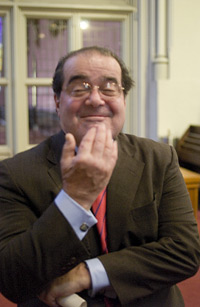
The Supreme Court dealt a massive blow to free speech today when it ruled that whistleblowers could not seek recompense for punitive actions, abridging their First Amendment rights. From the Christian Science Moniter:
Government employees do not enjoy free-speech protection against being disciplined for exposing official misconduct at work.
In an important decision that will make it more difficult for some government whistle-blowers, the US Supreme Court ruled Tuesday that public workers who make allegations of misconduct in official reports and in work-related statements may be disciplined for their speech without violating First Amendment protections.
The case which allowed the high court to establish this precedent centered around what may have been an illegally obtained warrant. In a time when serious questions about our civil liberties, particularly those pertaining to the Fourth Amendment which protects us from search and seizure without probable cause, the attitude from the newly configured court is especially chilling.
The 5-to-4 decision came in the case of Richard Ceballos, a supervising district attorney in Los Angeles. Mr. Ceballos had raised questions in a memo about whether a deputy sheriff had lied to obtain a search warrant. Ceballos later testified for defense attorneys who were attacking the validity of the search warrant and seeking to have the case against their client dismissed.
Other prosecutors in Ceballos's office disagreed with his assessment, and a trial judge ruled the case could go forward.
Ceballos was reassigned. He later filed a federal lawsuit saying his supervisers demoted him in retaliation for his memo and testimony on the search-warrant issue.
Today the Supreme Court gave carte blanche to government employers to fire, demote, or otherwise punish eployees who raise questions about the possible wrong-doing of public servants. Writing for a majority Justice Anthony Kennedy determined:
"When public employees make statements pursuant to their official duties, [they] are not speaking as citizens for First Amendment purposes, and the Constitution does not insulate their communications from employer discipline."
Not surprisingly the majority of five included the usual suspects and our newest appointments: Justice Samuel Alito and the freakishly Damien-like Chief Justice John Roberts.
In his dissenting opinion Justice David Souter wrote:
"But I would hold that private and public interests in addressing official wrongdoing and threats to health and safety can outweigh the government's stake in the efficient implementation of policy."
When those interests do outweigh the government's stake, Souter writes, "public employees who speak on these matters in the course of their duties should be eligible to claim First Amendment protection."









0 comments:
Post a Comment